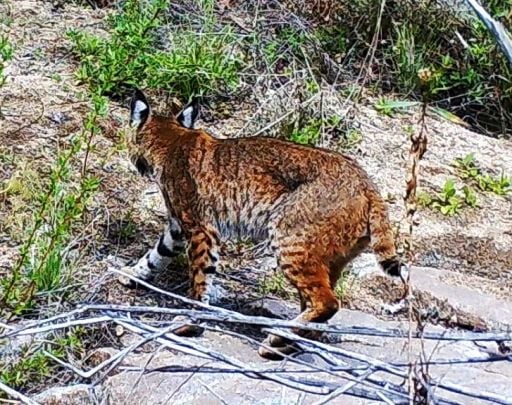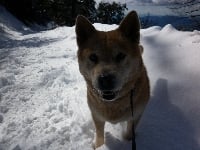Rose Peak (5058')
-
Sean

- Cucamonga
- Posts: 4249
- Joined: Wed Jul 27, 2011 12:32 pm
Peak 5058 sits along the ridge between Bear Canyon and Little Bear Canyon. In the early days of Switzer's Camp, it was known as Rose Peak, due to its coloration at sunset. Lizzie Miller describes the scene in her 1895 book, The True Way:
Before visiting Rose, I first wanted to see what Lizzie saw from her vantage point in the Arroyo Seco. So on June 27th a group of us walked down the trail from Switzer. We found her vista spot and caught the last light reflecting off the mountain at sunset.
I'm not easily impressed, but I suppose it looks kind of rosy. With better weather (it was still hazy in late June) and a better time of year for sun position, I bet the reflection would look more spectacular. Still, I enjoyed the evening stroll, and thanks to Cecelia, Nate, Courtney and Ken for joining me.
I scheduled the peak visit for Sunday, July 9th. The plan was to hike in from the Mt. Disappointment Road, going over Mt. Deception and continuing down the ridge to Supercloud Hollow and then Rose Peak. Colin, Nate, Keith and Cecelia would join me for this one. We planned to start cutting trail after Deception, and that's basically what happened.
We all met at 6:00 AM and started up the Disappointment Road, packing lots of water and our tools. There was a dismembered deer leg on the road. Which is generally considered a good omen, correct?
We left the road and turned onto the path for Mt. Deception. I had forgotten how the beginning of that trail is very steep.
It was Cecelia's second time on Deception, but her first time on the highpoint.
And I think it was Nate's first time as well.
After a short break, we stashed water and headed down the ridge to Supercloud Hollow. It's quite a nice ridge with great views all around. Much of the route was relatively open but we did have to bring out the tools for several overgrown sections of the old firebreak.
It's easy to miss the route if you haven't studied aerials of the firebreak. A key right turn was very overgrown. We spent extra time cutting back the thorny brush here. But once on the right path it's a straight shot down to the hollow.
Supercloud Hollow is a strange feature that resembles a dry lake bed. It is a place for sitting along the bank, under the shade of a pine tree, and inventing wild theories. We decided that underneath the hollow is a secret alien laboratory. If you tug on one of the branches, a hidden door will open up in the ground.
We left the hollow and continued down the ridge to Rose Peak, which finally came into view.
Following the ridgetop proved fairly easy, though we did do a good bit of cutting and trimming, mostly of whitethorn and yucca.
The summit was decorated with large rocks and a benchmark.
Colin had visited this peak many years ago and took a blurry photo of the benchmark. Through the power of suggestion I mistakenly read the name as "ROSE," but now we know that in reality it says "NO. 21." I hope this means that there are at least 21 similar benchmarks around the Arroyo Seco watershed.
We ate lunch on Rose Peak and enjoyed the view. To the south was Brown Mountain, and to the north was Strawberry and Josephine.
We could also see quite a ways further down the ridge.
Returning up the ridge took some effort. But we had already cleared the route, and thanks to our mild summer so far, it wasn't extremely hot, and the bugs weren't very vicious.
Before visiting Rose, I first wanted to see what Lizzie saw from her vantage point in the Arroyo Seco. So on June 27th a group of us walked down the trail from Switzer. We found her vista spot and caught the last light reflecting off the mountain at sunset.
I'm not easily impressed, but I suppose it looks kind of rosy. With better weather (it was still hazy in late June) and a better time of year for sun position, I bet the reflection would look more spectacular. Still, I enjoyed the evening stroll, and thanks to Cecelia, Nate, Courtney and Ken for joining me.
I scheduled the peak visit for Sunday, July 9th. The plan was to hike in from the Mt. Disappointment Road, going over Mt. Deception and continuing down the ridge to Supercloud Hollow and then Rose Peak. Colin, Nate, Keith and Cecelia would join me for this one. We planned to start cutting trail after Deception, and that's basically what happened.
We all met at 6:00 AM and started up the Disappointment Road, packing lots of water and our tools. There was a dismembered deer leg on the road. Which is generally considered a good omen, correct?
We left the road and turned onto the path for Mt. Deception. I had forgotten how the beginning of that trail is very steep.
It was Cecelia's second time on Deception, but her first time on the highpoint.
And I think it was Nate's first time as well.
After a short break, we stashed water and headed down the ridge to Supercloud Hollow. It's quite a nice ridge with great views all around. Much of the route was relatively open but we did have to bring out the tools for several overgrown sections of the old firebreak.
It's easy to miss the route if you haven't studied aerials of the firebreak. A key right turn was very overgrown. We spent extra time cutting back the thorny brush here. But once on the right path it's a straight shot down to the hollow.
Supercloud Hollow is a strange feature that resembles a dry lake bed. It is a place for sitting along the bank, under the shade of a pine tree, and inventing wild theories. We decided that underneath the hollow is a secret alien laboratory. If you tug on one of the branches, a hidden door will open up in the ground.
We left the hollow and continued down the ridge to Rose Peak, which finally came into view.
Following the ridgetop proved fairly easy, though we did do a good bit of cutting and trimming, mostly of whitethorn and yucca.
The summit was decorated with large rocks and a benchmark.
Colin had visited this peak many years ago and took a blurry photo of the benchmark. Through the power of suggestion I mistakenly read the name as "ROSE," but now we know that in reality it says "NO. 21." I hope this means that there are at least 21 similar benchmarks around the Arroyo Seco watershed.
We ate lunch on Rose Peak and enjoyed the view. To the south was Brown Mountain, and to the north was Strawberry and Josephine.
We could also see quite a ways further down the ridge.
Returning up the ridge took some effort. But we had already cleared the route, and thanks to our mild summer so far, it wasn't extremely hot, and the bugs weren't very vicious.
You do not have the required permissions to view the files attached to this post.
-
Uncle Rico

- Posts: 1481
- Joined: Thu Mar 20, 2008 7:48 pm
Kinda surly about missing this one. I tried to get to Supercloud Hollow once on a solo mission and got turned back by the thick brush. So I just sat on some rocks above and read a book on Zen Buddhism instead.
-
Girl Hiker

- Posts: 1445
- Joined: Fri Apr 04, 2014 7:46 am
I really enjoyed this peak! Getting there was easy. Thanks to the guys for clearing the trail. The hard part was the steep climb on the return.
You do not have the required permissions to view the files attached to this post.
-
tekewin

- Posts: 1385
- Joined: Thu Apr 11, 2013 5:07 pm
Thanks for organizing this, Sean. These historical explorations have been fun. Brush was not as bad as Black Jack. Also my second time to Deception and I also forgot how steep the initial climb was.
You do not have the required permissions to view the files attached to this post.
-
walker

- Posts: 248
- Joined: Mon Apr 08, 2013 11:14 pm
Thanks for getting this hike together, Sean! It was a little bit of hard work and a lot of fun!
For what it's worth, the name "Rose" appears to be mainly associated with the first era of Switzer's when the camp was run by Commodore Perry Switzer with help from Rob Waterman from 1884 to around 1897. There's a mention of Rosy Peak by Charles Pate in his recollections and several newspaper articles that refer either to Mt. Rose or Rose Peak. Miller is the only one who gives a relatively precise description of the peak's location as well as the reason behind its name.
The camp was closed after a fire in 1897 and remained empty until around 1906 when Martin took it over and rehabilitated the camp, followed by Lloyd B. Austin's stewardship of the resort from 1912-1936. Switzer's-related literature from 1906-1940 or so doesn't appear to contain any reference to the peak by the name Rose. The postcard images from this later era often use "Disappointment" for the entire ridge including Rose, but not sure if that was a simple way to relate the landscape to landmarks that would be familiar to Mt. Lowe visitors:
In any case, the name Rose is certainly more poetic! Here's a recent pic with the last sun on the peak, maybe it's a bit more peach-colored than rose-colored this time of year:
For what it's worth, the name "Rose" appears to be mainly associated with the first era of Switzer's when the camp was run by Commodore Perry Switzer with help from Rob Waterman from 1884 to around 1897. There's a mention of Rosy Peak by Charles Pate in his recollections and several newspaper articles that refer either to Mt. Rose or Rose Peak. Miller is the only one who gives a relatively precise description of the peak's location as well as the reason behind its name.
The camp was closed after a fire in 1897 and remained empty until around 1906 when Martin took it over and rehabilitated the camp, followed by Lloyd B. Austin's stewardship of the resort from 1912-1936. Switzer's-related literature from 1906-1940 or so doesn't appear to contain any reference to the peak by the name Rose. The postcard images from this later era often use "Disappointment" for the entire ridge including Rose, but not sure if that was a simple way to relate the landscape to landmarks that would be familiar to Mt. Lowe visitors:
In any case, the name Rose is certainly more poetic! Here's a recent pic with the last sun on the peak, maybe it's a bit more peach-colored than rose-colored this time of year:
You do not have the required permissions to view the files attached to this post.
-
Nate U

- Posts: 565
- Joined: Wed Apr 05, 2023 7:38 pm
Another great Front-Range brush-cutting investigative historical adventure lead by Sean!
• First time summiting Mt Deception. Brownish granitic rock makes up that peak within the sea of the area's white tonalite, creating a light brown gravel and sand which we then skied down a steep lightly-used trail to Supercloud Hollow (aka Dry Lake)
• Dry Lake is very cool. I’ve done more research, and still can’t find an explanation fitting the particular circumstances. My best working scientific theory is the tonalite eroded into a small circular basin for some reason, one which trapped water in a previously wetter climate, and the PH balance of the soil created by this acidic eroding-in-place rock (and potentially acidic evaporating in-place rainwater) resulted in a sandy acidic (or even alkaline maybe?) soil that is detrimental to being colonized by most trees and plants. Or its aliens. Or a buried super secret and still-active Nike missile site.
• After Dry Lake the use trail was no longer a trail at all, but the brush was pretty reasonable. A lot more exposed ledge along the rugged ridge was a big help to keeping brush reasonable, and the going was actually considerably easier than the buckthorn tunnel we had to dig going from the Strawberry trail to Black Jack Peak a few weeks ago. And my were we armed for battle this time, too! Colin, Sean, Keith and I all wielded loppers, and Colin had giant ones that could fell an oak tree, and yucca hedge trimmers even, which definitely came in handy at a few spots, declawing those fierce plants. All in all it was pretty decent going along the ridge, with views that never ever quit.
• It was great meeting the legend Colin “walker” for the first time, and hearing him and Sean discussing the history of the area was impressive to say the least. These guys know this stuff in a big way. Colin has explored the Arroyo Secco more than probably just about anyone that I know at least, and it was pretty cool to point to peaks and ridges and ask him about the history and navigability, because chances are he has been on them. There are many more expeditions to be had around that area that I’m definitely up for. I’m telling Sean he should try to be a Lizzie Miller completist, trying to identify, and then reach every peak she lists. You could also try to locate every Arroyo Secco Project benchmark, aka "Project Arroyo Secco Project.” ….. yes, I know I am an evil influence!!
• Although the benchmark didn’t actually read “Rose” like Sean hoped it would, it was super cool comparing to the blurry photographs of previous expeditions to decipher if we were looking at the same benchmark. Doing pretty much *anything* on top of a remote rugged scenic peak with no trail to it is really cool, and this was no exception.
• Can’t wait for more such adventures in the San Gabriel backcountry…. Sean and everyone else rule for researching and organizing this stuff!
6.14 miles, 2,621 ft elevation gain.
• First time summiting Mt Deception. Brownish granitic rock makes up that peak within the sea of the area's white tonalite, creating a light brown gravel and sand which we then skied down a steep lightly-used trail to Supercloud Hollow (aka Dry Lake)
• Dry Lake is very cool. I’ve done more research, and still can’t find an explanation fitting the particular circumstances. My best working scientific theory is the tonalite eroded into a small circular basin for some reason, one which trapped water in a previously wetter climate, and the PH balance of the soil created by this acidic eroding-in-place rock (and potentially acidic evaporating in-place rainwater) resulted in a sandy acidic (or even alkaline maybe?) soil that is detrimental to being colonized by most trees and plants. Or its aliens. Or a buried super secret and still-active Nike missile site.
• After Dry Lake the use trail was no longer a trail at all, but the brush was pretty reasonable. A lot more exposed ledge along the rugged ridge was a big help to keeping brush reasonable, and the going was actually considerably easier than the buckthorn tunnel we had to dig going from the Strawberry trail to Black Jack Peak a few weeks ago. And my were we armed for battle this time, too! Colin, Sean, Keith and I all wielded loppers, and Colin had giant ones that could fell an oak tree, and yucca hedge trimmers even, which definitely came in handy at a few spots, declawing those fierce plants. All in all it was pretty decent going along the ridge, with views that never ever quit.
• It was great meeting the legend Colin “walker” for the first time, and hearing him and Sean discussing the history of the area was impressive to say the least. These guys know this stuff in a big way. Colin has explored the Arroyo Secco more than probably just about anyone that I know at least, and it was pretty cool to point to peaks and ridges and ask him about the history and navigability, because chances are he has been on them. There are many more expeditions to be had around that area that I’m definitely up for. I’m telling Sean he should try to be a Lizzie Miller completist, trying to identify, and then reach every peak she lists. You could also try to locate every Arroyo Secco Project benchmark, aka "Project Arroyo Secco Project.” ….. yes, I know I am an evil influence!!
• Although the benchmark didn’t actually read “Rose” like Sean hoped it would, it was super cool comparing to the blurry photographs of previous expeditions to decipher if we were looking at the same benchmark. Doing pretty much *anything* on top of a remote rugged scenic peak with no trail to it is really cool, and this was no exception.
• Can’t wait for more such adventures in the San Gabriel backcountry…. Sean and everyone else rule for researching and organizing this stuff!
6.14 miles, 2,621 ft elevation gain.
You do not have the required permissions to view the files attached to this post.
-
dima

- Posts: 1734
- Joined: Wed Feb 12, 2014 1:35 am
- Location: Los Angeles
Cool trip. Any of you been up to Supercloud Hollow after a rain storm? Does it ever become an actual lake?
-
Sean

- Cucamonga
- Posts: 4249
- Joined: Wed Jul 27, 2011 12:32 pm
There is some conflicting information about the origin of the Disappointment name. Though it appears to have come from the Wheeler survey in the 1870s. I'm still looking for the original source for the popular story about the surveyors mistaking Disappointment for the highpoint (San Gabriel). But here is a snapshot of Wheeler's 1881 map, depicting Disappointment Peak right beside San Gabriel Peak.walker wrote: The postcard images from this later era often use "Disappointment" for the entire ridge including Rose, but not sure if that was a simple way to relate the landscape to landmarks that would be familiar to Mt. Lowe visitors...
Interestingly, in Wheeler's 1879 annual report, I found coordinates for the survey's "Disappointment" triangulation station. If the coordinates (34 14 50, -118 6 55) are correct, the station was closer to Deception than Disappointment. But I suspect they simply got the measurements wrong, as was normal for these old surveys.
You do not have the required permissions to view the files attached to this post.
-
Sean

- Cucamonga
- Posts: 4249
- Joined: Wed Jul 27, 2011 12:32 pm
I know a fellow trail worker who went up there after a big storm and said it was still empty. If we get hit with another series of atmospheric rivers, it might be worth trying to return in the winter.dima wrote: Cool trip. Any of you been up to Supercloud Hollow after a rain storm? Does it ever become an actual lake?
-
Girl Hiker

- Posts: 1445
- Joined: Fri Apr 04, 2014 7:46 am
Cool! will add my ascent but I stopped adding stuff more than a year ago.
-
Nate U

- Posts: 565
- Joined: Wed Apr 05, 2023 7:38 pm
There was no evidence of recently standing water like dried cracked mud or anything like that to suggest there had been standing water this past winter. Just loose, dry soil with a scattered few sagebrush growing here and there.dima wrote: Cool trip. Any of you been up to Supercloud Hollow after a rain storm? Does it ever become an actual lake?
-
HikeUp

- Posts: 4036
- Joined: Thu Sep 27, 2007 9:21 pm
Do a soil analysis to see why nothing grows.
-
walker

- Posts: 248
- Joined: Mon Apr 08, 2013 11:14 pm
Actually, there are several such "anomalies" in the San Gabriels.Do a soil analysis to see why nothing grows.
There's one in Devil's Canyon at the toe of the ridge to West Twin which I personally visited once in a moment of despair after a forced 20-mile brush thrash necessitated while trying to circumnavigate an active marijuana operation:
There's another one adjacent to Graveyard Canyon at the start of what eventually leads up to the Hawkins ridge systems. I think Sean went by there once during the youthful folly of his Death March days...
And the great grand-daddy of 'em all is Brown's Flat, which has actually been visited by a select handful of forum members:
I went back and recovered the link from our Brown's Flat discussions to this guy's PhD thesis with possible geological explanations of Brown's Flats but I have no idea if all of these phenomena are actually related or just coincidentally happen to look like flat lake beds in the middle of an impenetrable chaparral fortress.
https://www.cpp.edu/~sci/geological-sci ... Thesis.pdf
Anybody feel like planning a four-day pleasure cruise to tour the great dry lakes of the San Gabriels this fall?
You do not have the required permissions to view the files attached to this post.
-
Sean

- Cucamonga
- Posts: 4249
- Joined: Wed Jul 27, 2011 12:32 pm
Yes, Willie and I scrambled up to Doe Flat in 2014. That was a gnarly adventure. Check out the video!walker wrote: There's another one adjacent to Graveyard Canyon at the start of what eventually leads up to the Hawkins ridge systems. I think Sean went by there once during the youthful folly of his Death March days...
There's also one at the top of Dry Lake Canyon above Claremont, and a small one east of Newcomb Pass. I've actually seen water in that one, but not much.
-
Uncle Rico

- Posts: 1481
- Joined: Thu Mar 20, 2008 7:48 pm
Supercloud Hollow is reminiscent of the "lakes" you find along the Dry Lakes Ridge in the Los Padres. The depressions on that ridge are apparently not lakes (or ponds or whatever) at all, but are the result of the grinding of rock along the east-west thrust fault that runs along the ridge. Maybe Supercloud Hollow was similarly formed.
-
walker

- Posts: 248
- Joined: Mon Apr 08, 2013 11:14 pm
Thanks for the sleuthing about the survey party, @Sean !There is some conflicting information about the origin of the Disappointment name. Though it appears to have come from the Wheeler survey in the 1870s.
I took the opportunity to revisit a couple of sources. Charles Pate wrote at some length about Switzer's in a series of letters to the editor to the La Crescenta Ledger in 1948 with his recollections of the 1890s era at the camp. Here's what Pate has to say about Disappointment that is consistent with the labeling of those old postcards:
By Pate's account, the whole ridge from "Rose" back to Deception was generally referred to as Mt. Disappointment. After that:
Walker's Peak = Disappointment Peak
The Commodore = San Gabriel Peak
Hiram Reid recounts the tale of the survey party and actually agrees with the description of Disappointment as the whole ridge and acknowledges the non-official designation of San Gabriel as "The Commodore."
Reid goes on to acknowledge a few more of these non-official names, "named in this same spirit of fun and waggery" indirectly backing up Pate's mention of Walker's Peak among a couple of other place names mentioned both by Lizzie Miller and Pate like Lucky Camp:
What Reid apparently failed to realize is that Switzer's actual legal name was "Commodore Perry Switzer" so the "waggery" went back at least another generation!
Going back to Charles Pate, this passage possibly refers to "Rose" as "Rosy" but it's a bit confusing as he's describing a couple of different options to get up to the Mt. Disappointment area, one by bushwhacking along the ridges directly out of camp and another "preferred route" by going up the Arroyo towards Red Box:
I presume that "go on foot" means hiking without a horse or burro, so the "preferred route" would probably have involved some riding or at least taking a pack animal up the Arroyo - Most newspaper accounts of the early visits to Mt. Disappointment around this time described the trip as an overnight camp-out at "Lucky Camp."
Not exactly rock solid, but I think there's some evidence here to build a case for the disambiguation of all these competing names along this one ridgeline and the designation of 5058 as Rose.
To be continued...
You do not have the required permissions to view the files attached to this post.
-
Sean

- Cucamonga
- Posts: 4249
- Joined: Wed Jul 27, 2011 12:32 pm
The earliest account of the "survey party" story probably exists in one of the Wheeler reports from around 1875 or 1876. I've looked in Google Books but can't find it. According to this 1883 newspaper account, though, the survey party, led by Dr. F. Kampf, named it "Disappointment" because after several days of trying, they failed to reach it.
(Los Angeles Daily Herald, November 10, 1883)
(Los Angeles Daily Herald, November 10, 1883)
You do not have the required permissions to view the files attached to this post.
-
Sean

- Cucamonga
- Posts: 4249
- Joined: Wed Jul 27, 2011 12:32 pm
